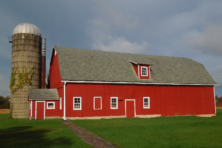Door County Dairy Barn Becomes Music Mecca
- Share
- Tweet
- Pin
- Share
Dozens of dilapidated dairy barns in Door County stand as sad memorials to what was once a multi-generation family industry. But the owner of one former dairy farm on County Road F has achieved a dream by giving it not one, but two new lives.
Dave Ellmann has a master’s degree and credit toward a Ph.D. in school administration and taught for a number of years in Germany, but when he returned to Door County in 1978, he had a different career in mind. One of his early jobs was bartending at Powell’s Country Inn, across from Gibraltar School. The six-piece jazz band that played there lived in the seven-bedroom house on the former dairy farm of Lawrence Reinhard, who founded the Door County Co-op. Once a showplace where FFA classes came to see the automated operation, Reinhard’s dairying days had ended a decade earlier.
Because the Reinhards were a bit uncomfortable having unsupervised musicians in the house, Ellmann suggested he move in to keep an eye on things. In 1984, the musicians departed, Ellmann rented the house and began offering rooms to college students with summer jobs and not much money for housing. A few years later he contracted to purchase the acreage that includes the farmhouse, the barn and several smaller buildings. Soon everything but the barn had been converted into living space for 17 students.
Early on, Fred Alley came to the farm and asked if housing was available for his older brother, Dave, who was joining the technical staff of Heritage Ensemble, predecessor of American Folklore Theatre. All the rooms were already filled, but Fred said his brother was “handy” and would be happy to sleep in a tent in the woods while he put a roof on an old shed. So Dave Alley joined Dave Ellmann and students-in-residence, Dave Perkins and Dave Muck, and the farm got its name – Camp David.
There’s always a waiting list for the 17 spots. Lots of kids return every year during college, working as wait staff, roofers, cooks, cleaners, landscapers and painters.
“Many of them go home better people than they arrive,” Ellmann says. “They learn to be responsible, to pick up after themselves, to get along with one another. They work in the organic garden and eat what it produces. They learn to recycle everything.”
They have access to concerts, a game room, a library, a weight room and a big deck for tanning. Sailing on Ellmann’s 25’ sloop is another perk.
Camp David has just three rules: No stealing. No dealing. No violence.
In 25 years, only three kids have been asked to leave. One was violent, and two were dishonest. Ellmann considers each year’s renters a family, and their group photos ring his office walls. Like families, they have their traditions – an annual hayride and bonfire and, at the end of summer, a “Thanksmas” dinner to mark the holidays they can’t celebrate together.
For 10 years, beginning in 1987, the final week of summer at Camp David ended with a three-day reunion party, open to the public. Hand-made admission buttons sold for $5. Music, beer and food were free. Crowds grew to 1,500, and in 1993 Ellmann announced there would be only three more parties. Those who could show their nine previous admission buttons got in free to the final event in 1996.
The second weekend in June, Ellmann will host a 25-year reunion party. Invitations have been sent to the 307 former renters and their families, who will be invited to camp on the grounds. As in the past, the weekend will include live entertainment, hayrides and lots of free food.
For a quarter of a century, Ellmann’s Camp David has provided affordable housing for summer workers in a county where it’s both scarce and expensive. That service alone is reason to make him a valuable resource to the Door. But – as the TV ads say – wait, there’s more!
In the mid-90s, when his $5 weekend celebrations were drawing to a close, Ellmann realized that what he really enjoyed was not the crowds of 1,500 (that required three days of property clean-up!), but the music that was part of those weekends. That was the beginning of Fishstock, Sunday night concerts, beginning in 1997, in the old dairy barn. The name – a combination of Fish Creek and Woodstock – was the brainchild of Stewart Dawson, who painted the huge fish on the barn as a surprise for Ellmann when he returned from a trip.
At first, Ellmann utilized just the hayloft. Dave Alley built a little stage, and a century-old piano was dragged upstairs. In the beginning, crowds of 20 or 30 sat on an assortment of old chairs to hear musicians from the community – including Mark Raddatz, Fred and Chris Alley, Doc Heide, Julian Hagan, Jay Whitney and a young teenager named Eli Mattson – who played for whatever was paid at the door.
For the first eight years, the concerts lost money, but as more and more musicians were attracted to the barn, the crowds grew. Eric Lewis, the award-winning guitar player from Memphis, was one of the first outside “names” to play the new downstairs stage, followed by Karen Mal, Andy Ratliff, Jimmy Kaplan, Chris Irwin, Tommy Burroughs and dozens of others. Fishstock became a genuine Door County phenomenon. Long before concert time, cars park in the adjoining field, and tables appear. Some tailgaters display white linen and live flowers, and at least one party last summer brought its own guitarist.
Ellmann says none of it would have been possible without four people: his brother, Steve, who supplies the sound equipment; Dave Alley, who built both stages and records concerts for AFT performers; Stuart Dawson, AFT’s set designer, who spends summers in a little cabin behind the barn and does whatever needs to be done for the Fishstock concerts; and Eric Lewis, who Ellmann says “is as important to the music scene in Door County as Fred Alley was to the acting scene.”
In 2005 the concerts began paying for themselves, and 2008 was the best year ever, with more than 750 at Eric’s Labor Day weekend concert. Ellmann credits much of the success to the fact that venues in Northern Door worked together to make sure they were all successful. Before he started Fishstock, for example, he talked with people at Birch Creek to make sure he would not duplicate the kinds of music they offer. A problem arose two years ago, when Egg Harbor began offering free concerts on Sunday nights. Now both Birch Creek and the Door Community Auditorium are dark on Sundays, and Fishstock’s income was cut in half in 2009.
Still, Ellman says, “As long as I’m alive, there’ll be Fishstock.” Headliners this summer will include Karen Mal, Chris Irwin, the Chapmans, JT and the Clouds, Eli Mattson, Jimmy Davis, Small Potatoes and Eric Lewis. One-by-one, their names will go up on the hand-lettered sign on the tiny trailer outside the stage entrance – Fishstock’s very own Green Room.



